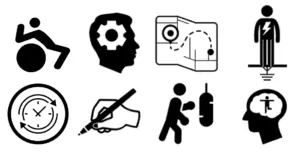Well-worn pathways
Imagine that you follow the same path through the woods outside your house to get to a river every day. It’s well-worn and easy to traverse. One day, for whatever reason, your path is inaccessible, so you have to go in a different direction through the woods. It’s going to be difficult and it’s going to require a lot more effort than it took to go down the path that’s well worn. But, if you go down the new path every day, it will become easy and automatic, just as the old one was. The longer the old pathway is left unused, the faster it will get overgrown and finally disappear.
Neural pathways in the brain
It’s the same in your brain. Well-worn pathways in there make up who you are and how you interact with people. The ways you think, feel, and act are based on the firing of your neurons—brain cells—in certain patterns or pathways. Those pathways were created by your experiences, mostly when you were young.
The more emotionally arousing the situation was when a pathway was created, or the more times the situation was repeated, the more robust the pathway is—and the harder it is to change.
Finding it hard to change? Want to improve your interactions with people?
We’ll talk.
Excerpt from Emotional Utopia, Stop Searching for Happiness and Start Living It
Contact me now to set up your free 15-minute phone consultation.










